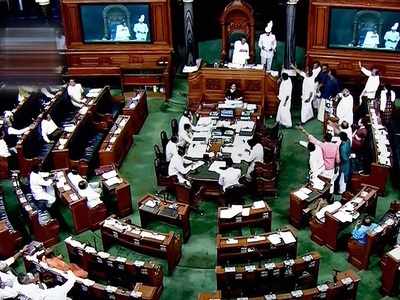- News
- India News
- After glut, Lok Sabha Speaker caps private member bills
Trending
This story is from December 8, 2019
After glut, Lok Sabha Speaker caps private member bills
The ceiling on the unlimited private member’s bills, “amendments” and “cut motions” has been brought about by new insertions in the “Directions by the Speaker” in the ongoing 17th Lok Sabha. A private member’s bill is a legislation introduced by a “non-minister MP” through which he draws the attention of the government to an issue that he considers is important enough to deserve a new law.

Key Highlights
- The ceiling on the unlimited private member’s bills, “amendments” and “cut motions” has been brought about by new insertions in the “Directions by the Speaker” in the ongoing 17th Lok Sabha.
- A private member’s bill is a legislation introduced by a “non-minister MP” through which he draws the attention of the government to an issue that he considers is important enough to deserve a new law.
NEW DELHI: In a major decision, Lok Sabha Speaker Om Birla has limited to three the number of private member’s bills that an MP can introduce in a session of Parliament. Also, the number of “amendments” that a member can move to the “Motion of Thanks to the President’s address” and “cut motions” to a “demand for grant” cannot exceed ten.
The ceiling on the unlimited private member’s bills, “amendments” and “cut motions” has been brought about by new insertions in the “Directions by the Speaker” in the ongoing 17th Lok Sabha.
A private member’s bill is a legislation introduced by a “non-minister MP” through which he draws the attention of the government to an issue that he considers is important enough to deserve a new law. The second half of every Friday during a session is dedicated to private member’s bills.
Sources said the changes by the Speaker were necessitated by the realisation that too many private member’s bills were being introduced by MPs, up to 10 a session, without much actual discussion taking place. There are 542 elected MPs, minus the Speaker, in the lower House. As a senior Lok Sabha official noted, “We have noticed that an entire session passes without complete discussion on one single bill.”
PRS Legislative Research, a think tank, has found that too many private member’s Bills are introduced without much discussion and a handful of MPs dominate the process.
The ceiling on the unlimited private member’s bills, “amendments” and “cut motions” has been brought about by new insertions in the “Directions by the Speaker” in the ongoing 17th Lok Sabha.
A private member’s bill is a legislation introduced by a “non-minister MP” through which he draws the attention of the government to an issue that he considers is important enough to deserve a new law. The second half of every Friday during a session is dedicated to private member’s bills.
Sources said the changes by the Speaker were necessitated by the realisation that too many private member’s bills were being introduced by MPs, up to 10 a session, without much actual discussion taking place. There are 542 elected MPs, minus the Speaker, in the lower House. As a senior Lok Sabha official noted, “We have noticed that an entire session passes without complete discussion on one single bill.”
“Quality of work” is the new mantra. According to sources, the Speaker wants that debate on one private member’s legislation should be completed in two sittings. The new sense of purpose could add urgency to an institution which is viewed as crucial for giving a say in law-making to ordinary MPs but which has become practically non-functional over the years.
PRS Legislative Research, a think tank, has found that too many private member’s Bills are introduced without much discussion and a handful of MPs dominate the process.
End of Article
FOLLOW US ON SOCIAL MEDIA










